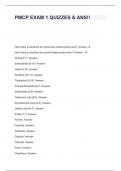Conjugated pi - Study guides, Class notes & Summaries
Looking for the best study guides, study notes and summaries about Conjugated pi? On this page you'll find 57 study documents about Conjugated pi.
Page 2 out of 57 results
Sort by
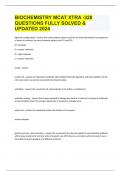
-
BIOCHEMISTRY MCAT XTRA -328 QUESTIONS FULLY SOLVED & UPDATED 2024
- Exam (elaborations) • 30 pages • 2023
-
- $15.99
- + learn more
Absolute configuratoin the nomenclature system used for the three dimensional arrangement of atoms in isomers; the most common systems are D/L and R/S R= clockwise S= counter clockwise D= right clockwise L= counter clockwise acetal Brainpower Read More 0:10 / 0:15 acetly CoA an important metabolic intermediate that links glycolysis and beta oxidation to the citric acid cycle; can also be converted into ketone bodies activation the conversion of a biomolecule to i...
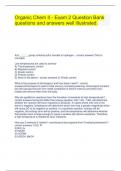
-
Organic Chem II - Exam 2 Question Bank questions and answers well illustrated.
- Exam (elaborations) • 16 pages • 2023
-
- $12.49
- + learn more
Organic Chem II - Exam 2 Question Bank questions and answers well illustrated. A(n) ______ group contains sulfur bonded to hydrogen. - correct answers.Thiol or mercapto Low temperatures are used to achieve- A) Thermodynamic control B) Reactant control C) Kinetic control D) Product control E) None of the above - correct answers.C) Kinetic control What is the purpose of dimercaprol, and how does it work? - correct answers.Dimercaprol is used to treat mercury and lea...
PMCP EXAM 1 QUIZZES & ANS!!
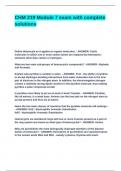
-
CHM 219 Module 7 exam with complete solutions
- Exam (elaborations) • 6 pages • 2024
-
Available in package deal
-
- $10.99
- + learn more
Define Heterocyle as it applies to organic molecules. Cyclic molecules in which one or mroe carbon atoms are replaced by heteratoms - elements other than carbon or hydrogen. What are two main sub-groups of heterocyclic compounds? Aliphatic and Aromatic Previous Play Next Rewind 10 seconds Move forward 10 seconds Unmute 0:02 / 0:15 Full screen Brainpower Read More Explain why pyridine is soluble in water. First - the ability of pyridine to accept Hydrogen bonding in...
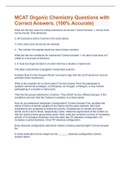
-
MCAT Organic Chemistry Questions with Correct Answers. (100% Accurate)
- Exam (elaborations) • 28 pages • 2023
-
- $9.49
- + learn more
What are the four rules for writing resonance structures? Correct Answer 1. Atoms must not be moved. Only electrons. 2. All resonance atoms must lie in the same plane. 3. Only valid Lewis structures are allowed. 4 . The number of unpaired electrons must remain constant. What are the two conditions for resonance? Correct Answer 1. An atom must have a P orbital or a lone pair of electrons. 2. It must be single bonded to an atom that has a double or triple bond. The latter comprom...
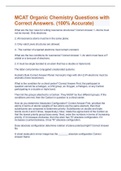
-
MCAT Organic Chemistry Questions with Correct Answers. (100% Accurate)
- Exam (elaborations) • 28 pages • 2023
-
- $9.49
- + learn more
What are the four rules for writing resonance structures? Correct Answer 1. Atoms must not be moved. Only electrons. 2. All resonance atoms must lie in the same plane. 3. Only valid Lewis structures are allowed. 4 . The number of unpaired electrons must remain constant. What are the two conditions for resonance? Correct Answer 1. An atom must have a P orbital or a lone pair of electrons. 2. It must be single bonded to an atom that has a double or triple bond. The latter comprom...
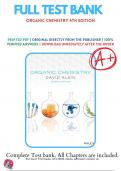
-
Test Bank for Organic Chemistry, 4th Edition by David R. Klein 9781119659594 | All Chapters with Answers and Rationals
- Exam (elaborations) • 2151 pages • 2023
- Available in package deal
-
- $22.81
- + learn more
Test Bank for Organic Chemistry 4e 4th Edition by David R. Klein. ISBN-13: 9594 Full chapters test bank PDF TABLE OF CONTENTS 1 A Review of General Chemistry: Electrons, Bonds, and Molecular Properties 1 1.1 Introduction to Organic Chemistry 2 1.2 The Structural Theory of Matter 3 1.3 Electrons, Bonds, and Lewis Structures 4 1.4 Identifying Formal Charges 7 1.5 Induction and Polar Covalent Bonds 8 1.6 Reading Bond-Line Structures 11 1.7 Atomic Orbitals 14 1.8 Valence Bond Theory 17 1.9 Molecular...
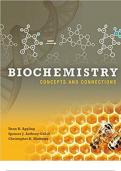
-
Test Bank for Biochemistry Concepts and Connections 1st Edition by Dean R. Appling, Spencer J. Anthony-Cahill & Christopher K. Mathews , ISBN: 9780321839923 |COMPLETE TEST BANK| Guide A+
- Exam (elaborations) • 102 pages • 2024
-
- $10.99
- + learn more
Biochemistry: Concepts and Connections (Appling et al.) Chapter 1 Biochemistry and the Language of Chemistry 1) The water content in the human body is approximately: A) 90%. B) 80%. C) 70%. D) 60%. E) 50%. Answer: C 2) The four most abundant chemical elements in living systems are: A) hydrogen, oxygen, sulfur and phosphorus. B) hydrogen, carbon, nitrogen and oxygen. C) sodium, potassium, carbon and oxygen. D) sodium, potassium, nitrogen and sulfur. E) carbon, nitrogen, oxygen and potassium. Answ...
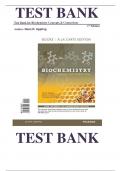
-
Test Bank for Biochemistry Concepts and Connections 1st Edition by Dean R. Appling, Spencer J. Anthony-Cahill & Christopher K. Mathews , ISBN: 9780321839923 |COMPLETE TEST BANK| Guide A+
- Exam (elaborations) • 102 pages • 2024
-
- $19.99
- + learn more
Biochemistry: Concepts and Connections (Appling et al.) Chapter 1 Biochemistry and the Language of Chemistry 1) The water content in the human body is approximately: A) 90%. B) 80%. C) 70%. D) 60%. E) 50%. Answer: C 2) The four most abundant chemical elements in living systems are: A) hydrogen, oxygen, sulfur and phosphorus. B) hydrogen, carbon, nitrogen and oxygen. C) sodium, potassium, carbon and oxygen. D) sodium, potassium, nitrogen and sulfur. E) carbon, nitrogen, oxygen and potassium. Answ...
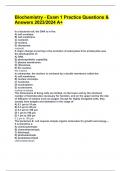
-
Biochemistry - Exam 1 Practice Questions & Answers 2023/2024 A+
- Exam (elaborations) • 10 pages • 2024
-
- $14.28
- + learn more
Biochemistry - Exam 1 Practice Questions & Answers 2023/2024 A+ In a bacterial cell, the DNA is in the: A) cell envelope. B) cell membrane. C) nucleoid. D) nucleus. E) ribosomes. nucleoid A major change occurring in the evolution of eukaryotes from prokaryotes was the development of: A) DNA. B) photosynthetic capability. C) plasma membranes. D) ribosomes. E) the nucleus the nucleus In eukaryotes, the nucleus is enclosed by a double membrane called the: A) cell membrane. B) nuc...

Study stress? For sellers on Stuvia, these are actually golden times. KA-CHING! Earn from your study resources too and start uploading now. Discover all about earning on Stuvia

